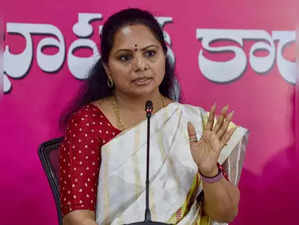Synopsis
Enforcement Directorate plans to file a charge sheet in the Delhi excise policy-linked money laundering case, naming Arvind Kejriwal, BRS leader K Kavitha, and others as accused, including individuals and companies.
 Agencies
AgenciesThe Enforcement Directorate (ED) is expected to soon file a fresh charge sheet in the Delhi excise policy-linked money laundering case and it may name Chief Minister Arvind Kejriwal, BRS leader K Kavitha and some others as accused, official sources said on Thursday. The federal agency had arrested Kejriwal from his official residence here on March 21 under the Prevention of Money Laundering Act (PMLA) while Kavitha, the MLC daughter of former Telangana chief minister K Chandrashekar Rao, was taken into custody from Hyderabad on March 15.
Official sources said a prosecution complaint against half-a-dozen entities, including the two politicians, some linked individuals and companies, has been readied and the agency may file it before a special PMLA court here within the next 4-5 days.
The accused will be charged with money laundering and the prosecution complaint will be filed under sections 45 and 44(1) of the PMLA, the sources said.
The agency may also name the Aam Aadmi Party (AAP) in this charge sheet along with attachment of some fresh assets in the case that was registered in 2022.
This will be the seventh charge sheet by the ED in this case in which it has arrested 18 people so far including Kejriwal’s party colleague and former Delhi deputy chief minister Manish Sisodia, AAP Rajya Sabha MP Sanjay Singh and others. Singh was granted bail sometime back.
AAP sources alleged that the expected complaint was nothing but the BJP‘s charge sheet and that the party in power at the Centre only intends to defame Kejriwal.
The ED sources said the agency is expected to charge Kejriwal with “non-cooperation” in its investigation and being “vicariously” liable for the offence committed by the AAP, being the national convenor of the said party and because of his role and active involvement in the day-to-day affairs and the conduct of the business of AAP.
It may reiterate its earlier charge made against Kejriwal, before a court, that as the AAP national convenor and member of its national executive, Kejriwal was “ultimately responsible for the funds being used in the election expenses including their generation”.
Kejriwal, 55, has been called by the ED the “kingpin and key conspirator” of the Delhi excise “scam” orchestrated in collusion with ministers of the Delhi government, AAP leaders and other persons.
The ED has also alleged that Rs 45 crore “kickbacks”, out of the Rs 100 crore “bribe” provided by the ‘South Group‘, were used by the AAP for the Goa assembly election campaign in 2022.
The ‘South Group’ liquor lobby allegedly includes Kavitha, TDP Ongole seat Lok Sabha candidate Magunta Sreenivasulu Reddy, his son Raghav Reddy and others.
The excise case pertains to alleged corruption and money laundering in the formulation and execution of the Delhi government’s excise policy for 2021-22, which was later scrapped.
Delhi Lieutenant Governor V K Saxena recommended a Central Bureau of Investigation (CBI) probe into the alleged irregularities. Subsequently, the ED registered a case under the PMLA.
The ED filed its money laundering case on August 22, 2022, taking cognisance of the CBI FIR that was lodged on August 17, 2022.
A day ahead of the scheduled pronouncement of its order on grant of interim bail to Kejriwal in the money laundering case, the ED told the Supreme Court on Thursday that the right to campaign in an election is neither a fundamental nor a constitutional right.
The central probe agency said there were numerous examples where politicians contested elections while in judicial custody, and some even won, but were never granted interim bail for campaigning.

